- Home
- Darcy Coates
Quarter to Midnight: Fifteen Horror Short Stories Page 5
Quarter to Midnight: Fifteen Horror Short Stories Read online
Page 5
Jodie gasped and keened right, towards where a barrier of shrubs would divide her from the figure. She turned too sharply and skidded on a patch of oil left on the asphalt. Jodie lost her balance as her legs slipped from under her. Then a white shape appeared out of nowhere, phasing through the rain, arms extended towards her. Unable to stop her momentum, she collided with the hard ceramic and tasted blood. The arms, colder than the rain, colder than ice, slipped around her in a dead man’s embrace.
Just like I caught it on that first day.
She struggled to pull back and worm her way free, but the grip was like a vice, crushing the air out of her lungs. Jodie raised her head as thunder pearled overhead; the deafening noise sent vibrations through her body. The mannequin’s ghastly white face stared down at her, inscrutable in the darkness as rain pinged off its glossy ceramic skin. More shapes were materialising behind it and to either side as the mannequins moved in, surrounding them.
Jodie opened her mouth to scream, and the mannequin pressed a long, frozen finger to her lips as it smiled down at her.
Miho jogged through the shopping centre, hands thrust into her jacket pockets as she tried to warm herself. She’d become drenched in the short run from her car to the centre’s doors. It was terrible weather, and the forecast didn’t expect it to clear for another day or two.
Their store’s doors were still closed, and Miho allowed her jog to slow to a brisk walk. She was late for the morning shift, but, by the look of it, so was Jodie. As she fished her keys out of her bag, Miho vaguely wondered if the other woman had woken up as sore as she had.
The shutters slid up into their case with a scraping, grumbling noise. The inside of the store was intact that morning—thankfully—and Miho had settled into her space behind the counter before she realised Jodie had taken the clothes of the mannequins.
Why on earth?
Jodie clearly didn’t like the dummies. After all that pressure she’d placed on Mr Heinlein to buy them, she’d actually seemed quite paranoid since they’d arrived. So why’d she go to the trouble of stripping their clothes off?
Miho began picking the items off the floor and re-dressing the mannequins. If she was being completely honest, she wasn’t a huge fan of them, either. They were always watching her… which was, of course, impossible; they didn’t even have eyes. Miho knew that it was meant to be a sign of good art if a painting’s eyes followed someone around the room. She wondered if the same principle applied to statues.
She was slinging a sweater over one of the female mannequins when she sensed Jodie standing behind her. Miho swung around, shocked and half laughing as she said, “Jo, you startled me. I didn’t hear you come in –”
The words died on her tongue as she faced the figure behind her. It wasn’t Jodie, but another mannequin. The face looked remarkably like her friend’s, though, almost as if it had been modelled off her. Miho leaned closer, frowning at it, wondering how she hadn’t noticed the similarities before.
Then something happened that Miho had no answer or explanation for.
The mannequin blinked.
MIRROR MAN
My earliest memory of the Mirror Man is from when I was four. My mother was trying to coax me into brushing my teeth by myself, but I was more interested in the man standing behind the bathroom door.
“Who is he?” I asked.
“Who is who?” Mum had replied.
I’d pointed to the man in the mirror, but my mother couldn’t see him. Frustrated, I’d turned around to ask him myself, but the room behind us was empty.
From then on, every time I looked into a mirror or highly reflective surface, I saw Mirror Man. Sometimes he was watching me. Sometimes, he was watching whoever was with me. Sometimes he wasn’t looking at anything in particular, just swaying from side to side.
He always stood in the darkest corner of the room and seemed to gather shadows about himself like a fog. I couldn’t make out much about him except that he was tall. I tried talking to him a few times, but he either couldn’t hear me or didn’t care.
When I realised no one else could see the Mirror Man, he became my little secret, something to watch when I walked past high-gloss windows or to catch glimpses of when I turned the back of my spoon to exactly the right angle. On a few occasions, I snuck into the bathroom late at night to talk to him after my parents had gone to bed. He never replied, and I soon lost interest in him.
When I was twelve, I stayed at my best friend’s house for a sleepover. I was brushing my teeth in their bathroom, which had a mirror larger than the one at my house, when Mirror Man caught my eye. I winked at him, as I often had when I was younger.
He was standing beside the towel rack, a place that was relatively bright compared to his usual corner haunts. The shadows still clung to him, but he was easier to see than normal. That was the first time I realised how impossibly thin he was. I’d always assumed he was an average weight, but I could see the bulk of his size came from his clothing–a long cloth wrapped around his body and limbs, crossing over itself and engulfing him. I thought I saw the fingers on his right hand twitch, but other than that, he was completely still.
“Damn, you’re a weird one, aren’t you?” I asked. I was answered with silence.
Mirror Man became bolder over the next few years. He left his usual corner more and more and moved farther into the light. The closer he came to the mirror, the easier he was to see.
By the time I was fourteen, I could see his mouth: a thin gash with pale, cracked lips. Once or twice, I made silly faces at him, trying to get him to smile, but he never did. I was sixteen when I started being able to see his hands clearly. He had long, bony, grasping fingers that occasionally twitched. It was the only movement I ever saw him make, except for his sporadic swaying.
Not long after my nineteenth birthday, he began standing directly behind me, staring at my image in the mirror over my shoulder. This was close enough to let me see almost all of him. Only his eyes remained hidden in shadows. He had no hair, and his skin was dry, thin, and stretched tautly over his face. There were such sharp indents below his cheekbones that it looked as if someone had stitched a cloth over a skull.
I graduated high school and left for college. Neither I nor my roommate cared enough about our appearance to replace our broken dorm mirror, and, to be honest, it was nice not to see Mirror Man hovering behind me every morning. I still caught glimpses of him in reflective glass doors and on the silverware, but he was easy to ignore. I graduated with good scores and a degree in IT.
The industry was booming at the time, and I received a job offer from a start-up a week after graduation. Even though the start-up failed after six months, I made connections through it and managed to get a job at Syneztic as their IT manager. I rented an apartment in a nice suburb just outside the city and, eventually, found myself a boyfriend. He moved in after a year of dating, and that’s when things went wrong.
Isaac liked to think of himself as a handyman and started renovating our apartment not long after moving in. One of the first things he added was a large wall mirror to the bathroom.
“We don’t need a mirror that big,” I said when I saw it.
“Uh, excuse you, but yes, we do.” He pecked me on the nose as he strode by, and that was the end of the discussion. As close as I was to Isaac, I would never be close enough to tell him why I didn’t like seeing my reflection.
I’d gone six years with nothing larger a palm-sized mirror, and the sudden reappearance of Mirror Man was a shock. He no longer tried to hide himself in the shadows, but stood so close behind me that I should have been able to feel his cloth wrapping brushing against my arm.
His eyes were finally visible. He had no pupils, and the irises were a vivid red. They were the only parts of him besides his hands that moved. His head held still, but his eyes kept flickering, glancing around the room for a second before fixing on me once again.
Unlike the mirror at my mother’s home, Isaac’s installation was too l
arge to allow me to avoid Mirror Man’s stare. He was always watching. When Isaac brushed his teeth beside me at night, Mirror Man would stand between us, occasionally flicking his glance at my boyfriend before settling his eyes back on my face.
It began to wear me down. When I was a child, Mirror Man had been a cool novelty, a private joke, something I’d winked at each night before bed. Now that I was an adult, his presence felt more and more like an invasion of my privacy and my home. I hated being watched while I showered. I hated seeing Mirror Man’s dead red eyes and twitching hands when I washed my face at night, and I hated that he was there to greet me every morning. I hid my discomfort the best I could, though I’m sure Isaac noticed I sometimes skipped showers and brushed my teeth at the kitchen sink.
Over that year, I was promoted twice at work, and we got a shelter cat. I was shocked one morning when our cat, Smucks, jumped onto the bathroom sink and fixed its eyes on Mirror Man. That was the first time I’d seen another creature react to my companion’s presence, and it was both validating and disquieting. I watched Smucks watch Mirror Man, and, after a moment, Mirror Man’s eyes flicked to the cat.
The reaction was immediate—Smucks hissed and arched his back, and the fur on his tail puffed up. He held that pose for a second then leapt to the floor and raced out of the room. Isaac found him hiding under our bed later that night, and I never saw him go into the bathroom again.
By that point, I could see every detail of Mirror Man perfectly: the bleached-grey wrappings, the blue veins that crawled across his bare head, and the flecks in his pupil-less red eyes. He was swaying more, and his fingers were twitching almost constantly. Sometimes, I thought I saw his bloodless, cracked lips tremble.
It ended on the morning of Saturday, the eighteenth of July. When I stepped out of the shower and looked in the mirror, I saw only my own reflection.
That was the first time I could remember when Mirror Man hadn’t been waiting for me. The glass was foggy from the hot shower, but there was no mistaking it—my stalker was gone.
I couldn’t believe it. I blinked and stared at my reflection, repeatedly scanning the shadows of the bathroom, feeling an exhilarated relief grow inside of me.
Then I noticed a handprint left in the fog that had gathered on the glass. The mark had been made by someone with long fingers. I slowly turned to face the room.
There, behind me, stood Mirror Man.
CRYPT
Pt 1
My sleepy little town has a few noteworthy attractions. A novelty giant plastic banana sits just within the town limits, a sad attempt to lure families into stopping on their trips upstate. We host an annual carnival that boasts not one, but two hayrides. And now, according to Julie Haze, we have a vampire in our graveyard.
Julie used to be pleasantly plump, but age, a diet rich in sugar and fat, and a predisposition to spending her day in her stuffed recliner left her more bulgy than curvy. Still, she manoeuvred through her tiny trailer with relative ease. Her three cats were attempting to out-weigh her, and, although she gladly joked about her own size, she wouldn’t hear a word of criticism against her pets.
When she’d been more mobile, she’d spent her life in the village, drifting from the restaurant to the park to the café, going anywhere she could find a soul to talk to. But with a bad hip and a hundred extra pounds weighing her down, she relied on visitors to her caravan to keep her company. And she made it very worthwhile to call in for an hour.
Julie seemed to know everything about everyone and had the town’s entire history stored in her brain. Through her, I’d learnt a bunker had been built under the church during the war but never actually used, that the mayor’s family had enough skeletons in their closets to start their own graveyard, and that the music store’s owner once had a whirlwind romance with a semi-famous actress.
I visited her at least once a week. Making friends had been difficult when I first moved into the tight-knit community, but Julie had embraced my company with open arms. In turn, I loved listening to her stories.
She shuffled through the caravan, tipping packet biscuits onto a plate and filling a pitcher with iced tea while the cats wove around her legs. “I’m afraid, Sara,” she said, placing the snacks on the folding table between the two overstuffed armchairs beside the window, “I’ve told you just about all of my best stories.”
I took a biscuit and nibbled on its corner while Julie settled into her chair. “Maybe you can re-tell some of the better stories? I wouldn’t mind hearing the one about the priest’s cat getting stuck on the roof again.”
Julie waved away my suggestion. “Don’t be ridiculous, honey. I said I’m nearly out; the well hasn’t run dry just yet. I spent all of this morning racking my brain for a good story to tell you, and I’ve remembered one I haven’t thought about in decades.”
I sat forward as Julie handed me a drink. “It’s a classic, then?”
“Well, it’s old, at least. And a lot of it is conjecture and guesswork, and I’m afraid you’ll have to suspend your belief from the rafters to get through it. But I think you’ll enjoy it.”
Julie settled back in her chair as one of the cats leapt into her lap. Her eyes were focussed on the window, where the off-white lacy curtains filtered the morning’s sun and created a mosaic of shadowy patterns across her face. She was silent for a moment, seemingly to collect her thoughts, then she wet her lips and began speaking.
It started, well, it would have to be a little more than fifty years ago. The town was smaller then and not so well connected to the cities. Most people didn’t have telephones, but we all had guns. A good number of wolves and bears would find their way into town, you see, and people needed a way to protect their families and livestock.
I was twelve at the time, just a few years older than Jack Suffle. The Suffles were one of the town’s founding families, though there aren’t any of them left anymore. Their father had died when I was a little girl, and the mother inherited his business. They were merchants—quite well-off.
Jack and his younger brother, Charlie, played in the town square most days. I don’t remember much about Charlie, except that he was a roly-poly little thing who tagged along after his brother every chance he had. He cried at the slightest provocation. I used to think he was a baby, but then, he was very young.
Jack involved himself in some insane antics. He got himself stuck in the well one time, and he very likely would have drowned if Charlie hadn’t run for their mother. Jack used to brag about going into the woods on his own, too, and say he’d shot wolves the size of horses. That was a load of bull, of course, but I suppose he liked to imagine himself as the man of the house, a real hero who’d protect his mother and brother, though he frequently caused more harm than good.
On this particular day—it was winter; I remember that because I’d gotten a new coat as a gift and was showing it off—Jack and Charlie came marching through the town. Jack had a shotgun over his shoulder, which wasn’t so unusual back then as it is now, and Charlie looked on the verge of tears. I asked where they were going.
“To the cemetery,” Jack said, sounding so proud of himself. “Charlie and me are going to hunt the ghouls there.”
I laughed, mainly to pretend that I wasn’t so impressed. Most of the town avoided the cemetery, except during funerals. The area was divided into two parts: the modern section—modern in that day, at least—and an older section full of cracked headstones and crypts. Our town was built over the ruins of a ghost town, you see. No one really knows who the original settlers were or where they came from, just that their homes had been long abandoned by the time the valley was claimed for our own town. All of the original buildings were demolished, except for the old cemetery, which the founders left intact when creating the new graveyard beside it.
Charlie was sniffling and saying he didn’t want to go, but Jack kept saying, “Go back to Mother if you’re scared.” Of course, the boy wouldn’t. He loved Jack. Would have followed him to the ends of the earth,
I imagine.
I walked with them past the town centre and into the farming territory. The cemetery was a short walk into the woods, hidden from the town, so I left them there and went home. I assumed they would fool around amongst the gravestones for a few hours before coming back.
When I came down for breakfast the following morning, my mother told me little Charlie Suffle had gone missing. I was shocked. It felt… what’s the word? Surreal. I remember digging my nails into the back of my hand until I drew blood because I was certain it had to be a dream. I asked what had happened, but my mother didn’t know. I told her about running into Charlie and Jack before they went into the woods, and my mother said she supposed a wolf had gotten him.
You can imagine how I felt. Sad–mostly for his mother’s sake–shocked, and very, very curious. Back in those days, an alley ran behind the pub, where we could wriggle into an alcove next to one of the air vents and listen to the men talking inside. All of the most important bits of news were aired in the pub. I went there as soon as I could after breakfast, but the alcove was already occupied–by Jack Suffle.
He’d been crying but was pretending he hadn’t. “They don’t believe me,” he said, before I could even open my mouth. “They think I’m making it up.”
“Making what up?” I asked.
“The vampire.”
I put two and two together. “Is that what got Charlie?”
Jack nodded, and though he wouldn’t look at me, he beckoned for me to sit next to him. “It was in the crypt–the ones in the old part, you know? I saw it first and fired my gun at it, but that just made it angry. I told Charlie to run. I thought he was behind me, but when I got to the crypt door, he wasn’t there. They don’t believe me. Not even mother.”
He was doing an increasingly bad job of hiding his tears, and I’m afraid to say I wasn’t much comfort. We sat for a while and caught snatches of conversation from inside. Men were arguing about what to do and whether they should arrange a second search of the forest. Apparently, a group of men had already looked for the lost boy shortly after Jack had returned home without his charge, but they had been forced to abandon the search when nightfall had made the woods too dangerous. Some of the men thought Jack had lost his brother during the walk and that there was a chance the child was still alive in the woods. Others thought Jack may have accidentally killed him–maybe a slip of the gun or the child had fallen off a cliff–and was too ashamed to tell the truth. A third faction was in favour of believing at least part of Jack’s story and searching the graveyard.

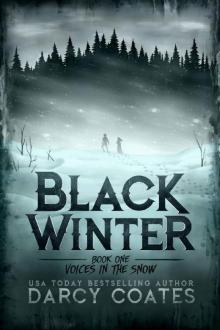 Voices in the Snow
Voices in the Snow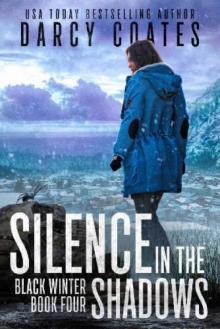 Silence in the Shadows
Silence in the Shadows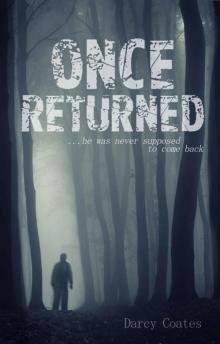 Once Returned
Once Returned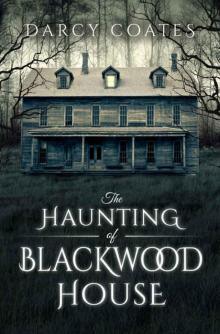 The Haunting of Blackwood House
The Haunting of Blackwood House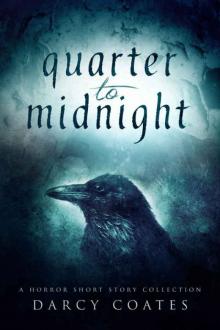 Quarter to Midnight: Fifteen Horror Short Stories
Quarter to Midnight: Fifteen Horror Short Stories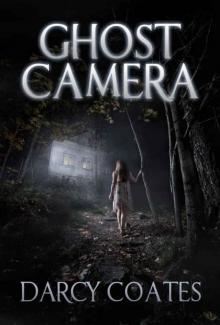 Ghost Camera
Ghost Camera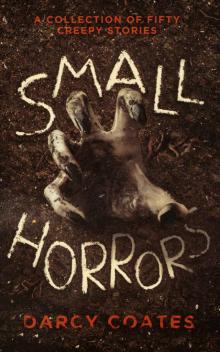 Small Horrors: A Collection of Fifty Creepy Stories
Small Horrors: A Collection of Fifty Creepy Stories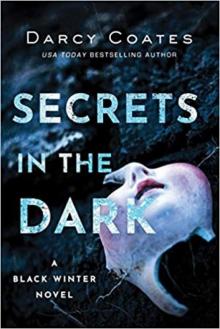 Secrets in the Dark
Secrets in the Dark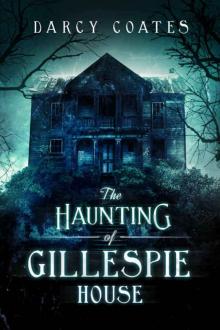 The Haunting of Gillespie House
The Haunting of Gillespie House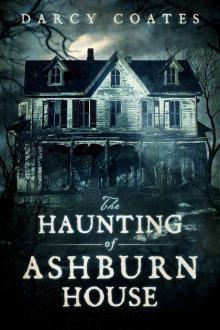 The Haunting of Ashburn House
The Haunting of Ashburn House